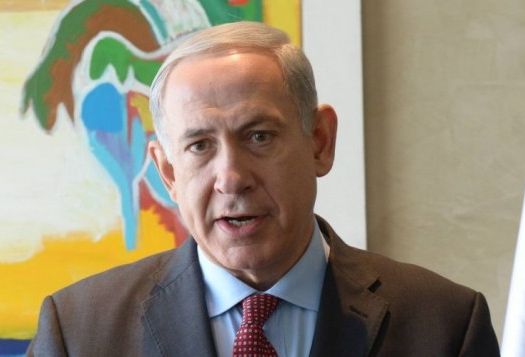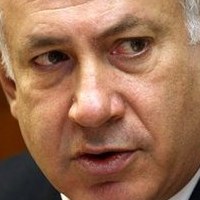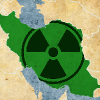![]()
By Crethi Plethi

Israel’s PM Benjamin Netanyahu makes a statement about Iran at Ben Gurion Airport, November 8, 2013. (Photo credit: Amos Ben Gershom / GPO / Flash90)
Middle East analyst Jonathan Spyer wrote in the Jerusalem Post — November 1, 2013 — that “15 North Korean helicopter pilots are operating on behalf of the Assad regime” within Syria. What motivates the North Koreans to assist Assad in his struggle against the mainly Sunni Jihadi rebels? Spyer argues that punished by international sanctions, the North Koreans are looking for ways to earn some money, but it is also a logical consequence of the long-term relationship between Pyong Yang and Damascus. And who is paying the North Koreans? Most certainly Iran, as they are committed to keep Assad’s regime alive, or in any case a pro-Iran regime. Syria, although not a Shi’ite state, is a vital part of the regional Shi’ite solidarity which extends Iran’s influence into the Arab World.
The recent developments in the Middle East, especially the Sunni Islamist resurgence throughout the entire Arab World [with a few setbacks in Tunisia and Egypt], Iran’s developing nuclear weapons and Obama’s failing Middle East policy, presents a grim prospect of Israel’s security in the long term, regardless of the outcome of Syria’s civil war, the Geneva talks and the Sunni-Shi’ite conflict in the Middle East.
Yes I know, Israel’s technologically advanced economy has recovered better than most other world economies since the global financial crisis of 2008-2009, Israel is one of the most advanced high-tech centers in the world, and it has a future of self-sufficiency in energy areas since the massive finds of natural gas fields in the Eastern Mediterranean, but this success can also make the Israelis overconfident and eventually threaten Israel’s security if it progresses towards peace and a two-state solution with the Palestinians followed maybe by defense budget cuts.
Of course, a peaceful solution with the Palestinians is desirable, but not without being prepared at all times both military and politically.
Think about it,
Obama has emerged as a naive, unreliable and sometimes very critical ally of Israel. And it seems there’s now a ‘crisis of faith’ between Israel and the U.S. over a possible nuclear deal with Iran. Admittedly, this has not yet led to reduction of U.S. military aid to Israel, but that doesn’t mean this will not happen. See for example Egypt.
Once a strong U.S. ally, Egypt now beckons to Putin’s Russia, because the U.S. is reducing its military aid to Egypt since General Abdel Fattah Al-Sisi removed Islamist President Mohammed Morsi from power. Obama keeps stubbornly supporting the Muslim Brotherhood which will prove to be a costly mistake, since the Egyptian people made it clear they don’t want a Muslim Brotherhood dictatorship. To the Egyptians, Al-Sisi is a hero, but Obama is now their enemy.
Al-Sisi’s rapprochement with Russia is also for Israel worrying in view of Russia’s pro-Palestinian stance in the peace process.
Iran’s nuclear ambitions have no limits and the charm offensive by the new president of Iran, Hassan Rouhani, tempted Obama to fall in Rouhani’s trap and agreed to a new round of negotiations for a possible diplomatic solution to the nuclear dispute. This wishful thinking is an epic mistake, because the latest news reports suggest Iran “could build nukes in just two weeks” despite the fact that apparently a nuclear deal is taking shape in Geneva over Iran’s nuclear program.
Netanyahu, calling it the “deal of the century” for Iran, believes the Geneva deal will enable Iran to become a “nuclear breakout state.” According to this article, “Iran would retain its nuclear enrichment capabilities, and would thus be capable of racing to a bomb at short notice at a time of its choosing.”
Iran gets what it wants: applause from the world community for making a deal and… a nuclear bomb. The slowing effect of the current negotiations (and subsequently lifting of some of the international sanctions in the process) was exactly what Tehran needed (and needs). This combined with the fact that the Iranian Revolutionary Guard is already actively involved in the Syrian civil war will not only keep Netanyahu awake at night.
And what if Iran breaks the deal? I don’t believe Obama will ever use military force to stop Iran from having a nuclear bomb which in that stage would probably be too late anyway. Netanyahu warned U.S. Secretary of State John Kerry that “Israel is not obliged by this agreement and Israel will do everything it needs to do to defend itself and the security of its people.” But is an Israeli solo strike on Iran’s nuclear facilities still an option? The entire international community is now publicly lined up in search of a nuclear deal and taking on Iran militarily could mark Israel as an aggressive non-peaceful country leaving it vulnerable to strong criticism, UN condemnation [sanctions?] and further diplomatic isolation.
It’s a devil’s dilemma, but for Israel, doing nothing is almost not an option either. And whatever Israel will do or don’t do, it will make nobody happy. It is very well possible that Israel will soon have to tolerate a nuclear power at its border.
The way Obama styled his Middle East policy only frustrated his Mideast allies. In a sense the entire pro-Western bloc in the Middle East (Turkey, Egypt, Israel, Jordan and the Gulf States without Qatar) is falling apart and could even lead to a nuclear arms race since the United States fails to guarantee the needed security for its Mideast allies against Iran’s nuclear ambitions.
Yet, there is one positive side to Obama’s desastreus Middle East policy. Israel and the Gulf States have a common interest in stopping Iran making a nuclear bomb and not only Israel but also the Gulf States believe “that the current U.S. administration is hopelessly naive on the Middle East.” This could lead to the opening of some sort of dialogue between Israel and the Gulf States on more issues as well. But at the same time this is a fragile alliance. After all, the Gulf States will not take any steps to full diplomatic relations with Israel until there’s a peaceful solution to the Israeli-Palestinian conflict.
The challenges Israel is facing cannot be solved without strong and like-minded friends who will support Israel in times of difficulty and hardship. But such unconditional support from Israel’s traditional friends (the West) is eroding. Israel has already experienced this when the UN approved the de facto recognition of a sovereign Palestinian state in November 2012, the EU labelling of Israeli products from settlements in the West Bank, the EU ban on funding to Israeli institutions that operate in the West Bank and now again with the Geneva talks about Iran’s nuclear program.
It is a slow process of decreasing sympathy and support for a small democratic country in the Middle East surrounded by enemies. And I’m not very hopeful this will change soon, unfortunately. You don’t need to be a prophet to understand what direction we’re heading if one listens well to what Western policymakers are saying about certain aspects of the Israeli-Palestinian issue and other Middle Eastern issues as well. I hear many inaccuracies, misinformation and even unreasonable arguments on issues such as the Area C issue, the BDS movement, and also diplomats actively supporting the Palestinian cause, but also about the so-called ‘Arab Spring,’ and the Syrian Civil War. Most of these inaccuracies and misinformations stem from an ideological naiveness among the Western elites.
I expect that over the next few years we will witness an almost unbearable pressure on Israel by the international community. The next president of the US will not necessarily act differently than Obama on Middle Eastern issues. The EU will continue to develop into a bureaucratic institution where the left-liberal ideological aspect will continue to prevail over the formerly Judeo-Christian culture of Europe. This does not bode well for Israel.
Russia, China and Turkey will also continue to secure their increasingly large interests in the Middle East. Indeed, China maintains good relations with Israel, but also with Iran (or even more with Iran) because of China’s strong ties with Iran’s economy and support for Iran’s nuclear program. Turkey’s neo-Ottomanism defines its Middle East policy as a regional superpower while Erdogan’s anti-Israel sentiment is still dictating Turkey-Israel relations. The Russians will continue their pursue for strategic success in the Middle East which could lead to a new “cold war” era in the Middle East.
The power struggle in the Middle East and the Palestinian issue will continue to be a risk to Israel’s security, and I don’t believe a peace agreement with the Palestinians (if ever) will change that.
Western Jihadi volunteers (supporting the Sunni rebels) and the Iranian Revolutionary Guards and the North Koreans are fighting in Syria’s civil war, thus globalizing the Syrian conflict.
The question is whether these developments will eventually endanger Israel’s existence as well.
Crethi Plethi is the pseudonym for Harald van Es and is the founder and director of CrethiPlethi.com. He writes articles for CrethiPlethi.com in Dutch and English on the Middle East, Israel, Revolutionary Islamism, Multiculturalism and the Netherlands. He has lived in Jaffa (Tel Aviv), Israel. He currently lives in the Netherlands. For all the exclusive blog entries by Crethi Plethi, go here.



 RSS
RSS










Latest Comments
Hello Mike, Thank you for your positive feedback to the article. I felt there wasn’t too much critical analysis of ...
Thanks for this considered and well constructed article. A follow up article on the manner in which the editorial contro...
THE CLUELESSNESS OF CLAIMING THAT OBAMA'S MIDDLE EAST POLICIES WERE A FAILURE CANNOT BE FURTHER FROM THE TRUTH, WHAT THE...
As long as Obama is the president of the usa do not trust the us government......
Thank you for an good read....